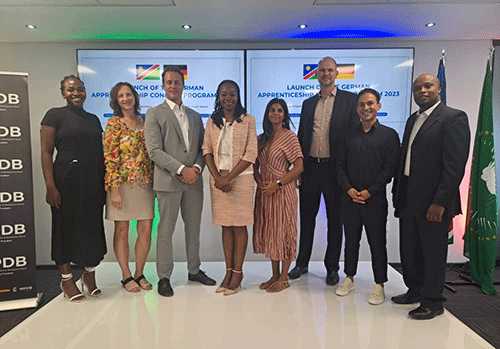Julina Kaakunga
As Namibia grapples with a high youth unemployment crisis, the Namibia Investment Promotion and Development Board (NIPDB) has teamed up with the Goethe-Institut to send young people to Germany where apprentices are needed in large numbers.
Through this collaboration, Namibian youth enrolled in apprenticeship programmes will be given an opportunity to study, live and work in Germany in various trades and professions.
Goethe-Institut director Dennis Shroeder stated that a shortage of apprentices in Germany is a problem, adding that a recent survey found that 42% of German companies were unable to fill all their apprenticeship positions.
He said the German Economic Institute reported a 10% drop in new apprenticeship contracts in the past 10 years. This shortage is compounded by the rapid retirement of the baby-boomer generation, leaving a gap in the skilled workforce, with about 350 000 workers retiring each year.
“And that is why this partnership presents a unique opportunity for synergy. By training Namibian youth, we not only address the unemployment issue here but also help fill the growing gap in Germany’s skilled workforce,” he said.
Shroeder further said the two countries have a shared history both tragic and complex, but also full of hope. However, today, they are working on shaping a new friendship defined by mutual respect, cooperation, and a commitment to progress, according to Shroeder.
“The Goethe-Institute and NIPDB, under the partnership between our nations, are at the forefront of this new chapter. We are not just facilitating cultural exchange; we are actively opening doors for vocational training opportunities in Germany for the youth of Namibia,” he added.
According to Julia Muetudhana, the executive director of Talent, Innovation, and Productivity at NIPDB, the two nation’s shared history has resulted in Namibia having a high number of German-speaking nationals, which makes the transition easier.
“Parents must be assured that we are sending our children with dignity, and it is not cheap labour, where they will be working in kitchens,” she said.
Nangula Uaandja, the executive officer of NIPDB, explained that one of the things that investors look for when recruiting is skills, adding that a university degree and Grade 12 certificate do not equal skills and although skills do not necessarily require a degree either, the two can be combined.
“The best way for someone to learn is 70% on the job, 20% peer group learning, and 10% classroom,” she said.
Those who wish to partake in the programme require a German language certification, visa application funds, flight tickets to Germany, and settling-in funds.
Nevertheless, those without a German language certification will need additional funds to enrol for a German language course and examination.
Furthermore, an interested candidate must be a Namibian citizen, between the ages of 18 and 25, possess at least a Grade 10 certificate, and be able to speak, read, and write German.
Candidates not equipped with the German language should be available for German language classes at the Goethe Institut.
The programme will have two intakes in 2024 and 2025. – julinak990@gmail.com



